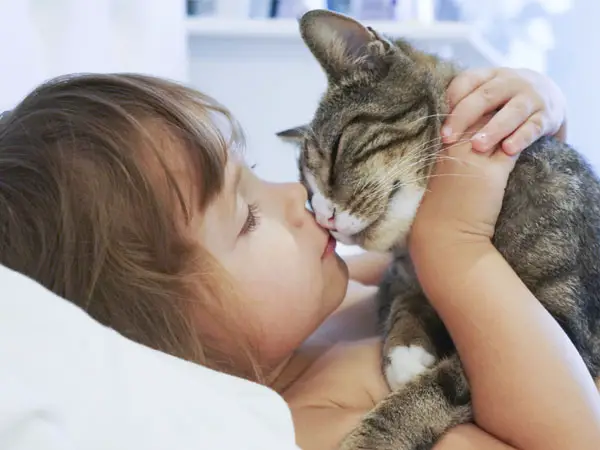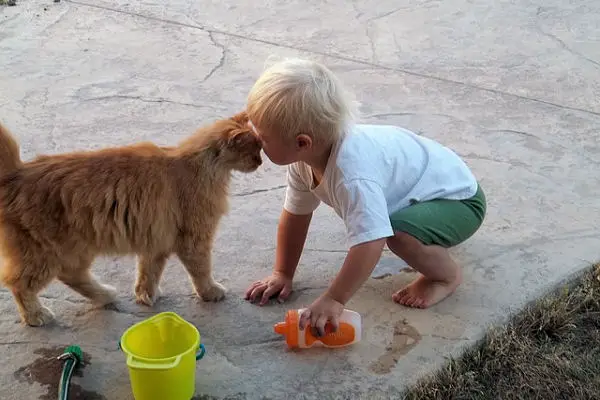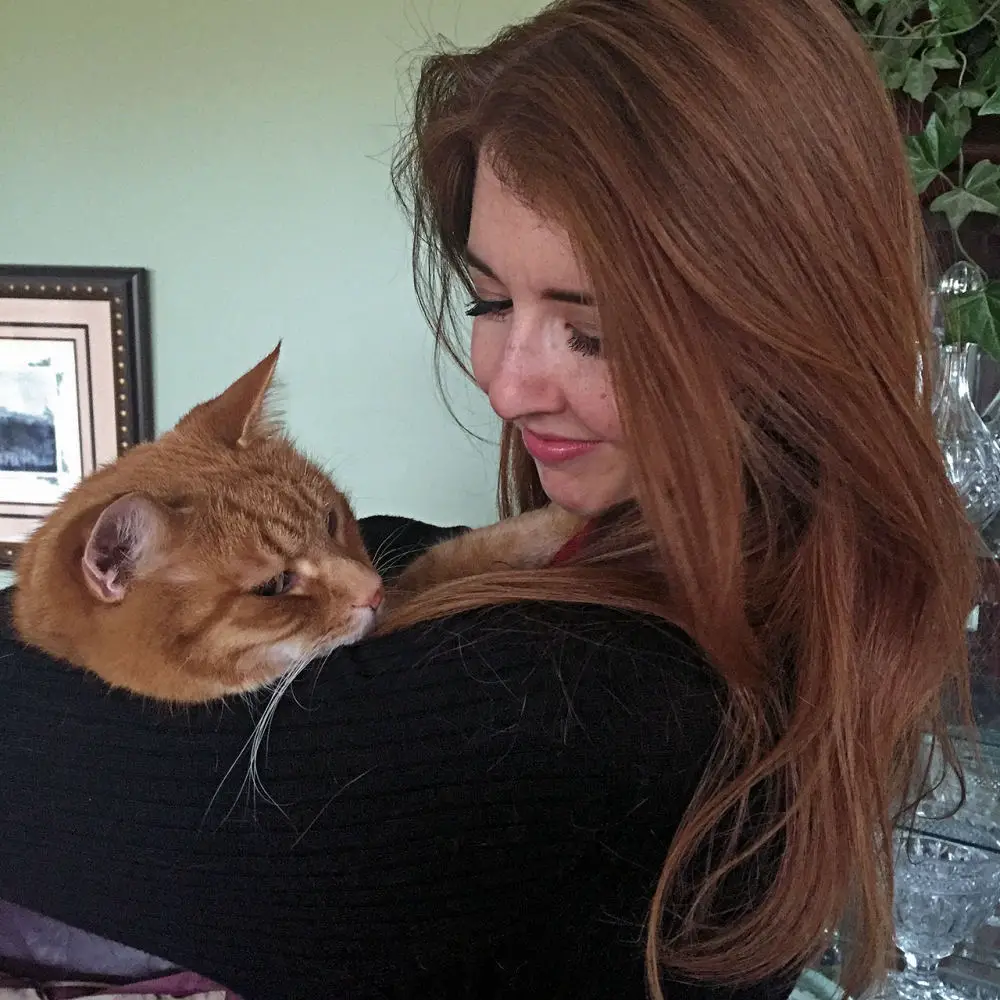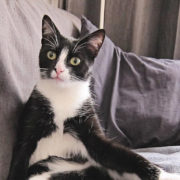For individuals with autism, getting through the day can be an overwhelming task. More than just overwhelming, the world can be over stimulating, isolating, and scary. Any parent who has experienced the difficulties their child endures every day knows the helpless feeling that is associated with the condition. For children on the autism spectrum, emotions, experiences, and social connections that we take for granted are not always within reach. It is with that in mind that parents seek any kind of relief or normalcy for their child in a world that is not always easy.

With that in mind, researchers have been looking for any possible relief or treatments for autism. There have been millions upon millions of dollars spent researching remedies or coping tools. One of the things that they found came as no surprise:
A cat.
Yes, millions of dollars spent on relief for autism and one of the most effective remedies is a furry little friend to love.

As it turns out, the same attributes that even the most able bodied and minded individual love and grow from pet ownership are the very same attributes that help alleviate some of the strain of autism and teach coping mechanisms to the sufferer.
- Calming – Is there anything more relaxing than sitting in a comfy chair and petting your cat? Individuals with autism are often existing on an elevated level of stress, primarily because of the way their body interprets sensory information. Imagine trying to remain calm while someone runs their nails down a chalk board. Hard to do, right? Many individuals with autism interpret everyday sounds as being abrasive and jarring, just like those without the condition would interpret nails down a chalkboard. Having a cat on their lap or to play with greatly reduces the stress level and allows relief.
- Teaches empathy – Individuals with autism often have difficulty understanding social or emotional cues that would otherwise seem obvious to those who do not have the condition. Having a cat teaches and heightens one of the most difficult emotional cues for autism suffers to grasp: Empathy. Studies have shown that the increased perception of empathy then goes beyond just the animal, but is then transferred into other aspects of their life.
- A love without expectations – Autistic individuals receive a lot of rejection. That might not be the most pleasant thing to think about or accept, but they do. They are often misunderstood and experience many displeased looks or flat out rejection. A cat does not say unkind things, it loves unconditionally. This kind of love is a wonderful change of pace in a world that can be full of hardships.
- Socialization – Social situations can be hard to deal with for anyone, but they can become downright paralyzing for an individual with autism. Studies have shown that cats help autistic individuals acclimate to social environments easier. Whether it is because cats are a universal common ground for most humans that allows a conversation to happen between an individual with autism and someone without it, or if being more in tune with the social cues because of the time an autistic individual spends with a feline, the studies show that individuals with cats in their lives are more easily adaptable to social situations.
- Connection – We all know the love and connection we share with a pet. It is something intangible that gets to the core of who we are and how we relate to the world. Think of all the bumper stickers out there that say, “My favorite people are my cats”. We can all agree that cats sometimes make better companions than people do. Now, for individuals with autism, that connection to another living creature can be vital. Autism generally stunts the individual’s ability to understand human behavior and social cues, which can often be isolating and hard. These feelings of isolation often result in lashing out and undesirable behavior. Cats, however, do not have such social cues. They don’t have words and they love and comfort. This connection with another living creature is of great comfort to people with autism, and studies have shown that the connection experienced with a pet can translate into improved connections with people.
- Comfort others in distress – We already discussed empathy, which is the understanding of feelings. Empathy is a hard thing for individuals with autism to grasp, and having a cat helps them build empathy for other creatures. Another quality that improves for autistic individuals when a kitty is introduced into their lives is the ability to take that empathy and attempt to comfort others in distress. It is one thing to understand that someone is in distress, but it takes another higher level function of understanding to attempt to comfort someone else in distress. Learning to read the social, emotional, and distress cues from cats helps build and establish that higher level order of compassion in autistic individuals.
- Improved mood – Now, this could easily be said of any of us. Being around a cat is a surefire way to improve anyone’s mood, but for parents or loved ones of individuals on the autism spectrum know, a good mood is a fickle and fleeting thing. Studies have shown that simply being around a cat or having a cat live in the home of an individual with autism will greatly improve their mood and reduce the number of outburst.

Autism is a hard condition to understand for those who do not experience it daily, whether you have the condition or a loved one does. The autism spectrum is vast, and it is not always easy to tell when an individual is afflicted with the condition. The magic of having a cat in the life of an autistic individual is that the spectrum disappears. It is a world where the ticks, the outbursts, the fear, the frustration, and the hardships associated with autism disappear.
A cat doesn’t care or understand if you have autism – they understand love. Is there any greater gift that we can give our loved ones?





My niece is autistic. Her cat and her are inseparable. It’s amazing to see them together. They communicate without speaking.
I helped out back in April for National Autism Awareness – please keep writing articles like these!
Cats are such a perfect fit for kids with spectrum disorder. My daughter has a mild case and her cat (Molly) has an uncanny sense of communicating with her.
My daughter has Asperger’s syndrome and she has two cats, Maxx Jackson and her new one Tyson. I have seen a change in her with her cats, she just sits on her bed and pets the both, and just talks to them like she is talking to me!
This is a topic that needs continued exposure – my brother has autism and he and his cat (Oscar) are amazing together!
Please post more articles like this. I own 7 cats and we have a nephew who is autistic and he could spend all his time here.
This is a wonderful resource for autistic children & their parents who are trying to search for ways to help them have connection & fulfillment in their lives. Just think about how many cats lives could be saved from rescue group’s & shelters if all families with autistic children adopted a couple of cats each, or at least one. It’s a win -win situation!
I am an individual with Asperger’s Syndrome, which is on the milder side of the Autism spectrum. I have always had a special connection with animals, but when my family adopted a kitten a few months ago she bonded with me right off.
She has helped with my anxiety and stress levels.
This is amazing, I have autism and I get along with my cat (coco) very well. We curl up together and let our anxiety release..
My son is autistic and 5 yrs old we are having a lot of difficulty in Special Ed TK…and he was kicked out of his ABA program…I got 2 cats hoping it would help…but he wants to hurt them…why??? He squishes them and bites them and my cats are almost 1 now but they won’t scratch or bite him! It’s so hard for me and I don’t want the cats to get injured…I don’t know how I can help him…I had a very special relationship with my cats at his age.